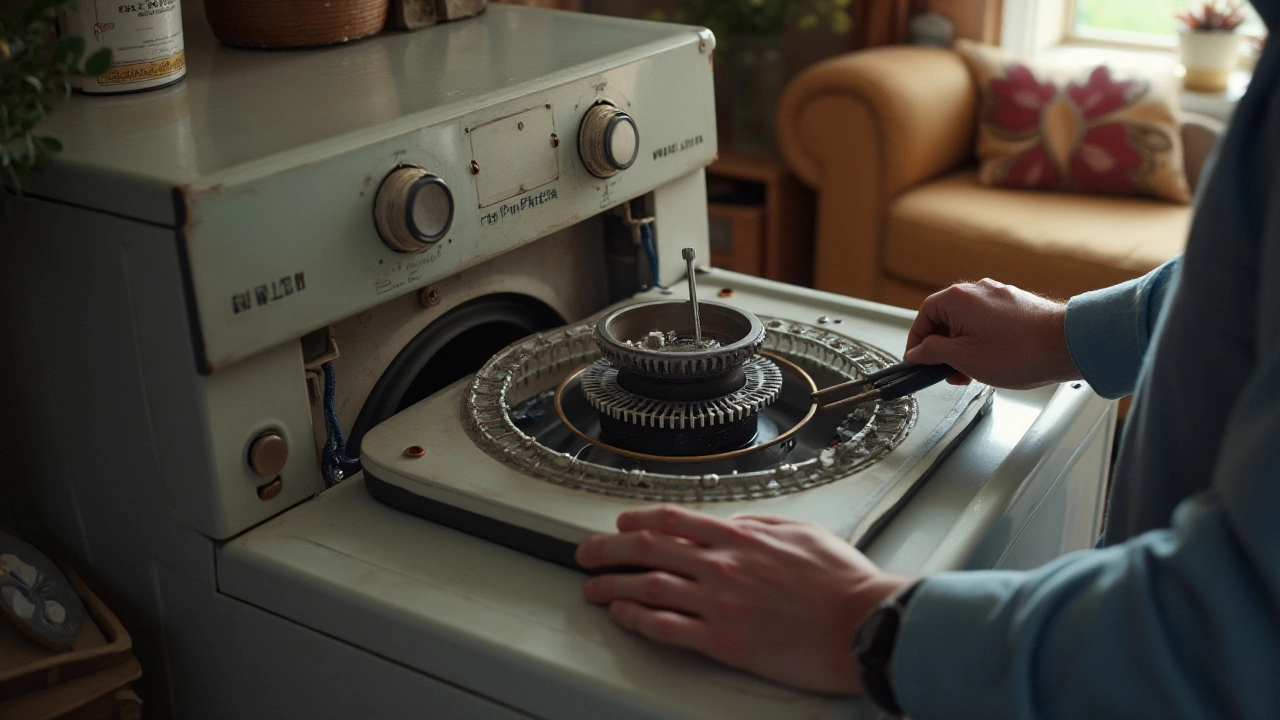Our homes are filled with appliances that make life convenient and efficient. But have you ever paused to wonder how these remarkable machines work? Understanding the mechanics behind them not only satisfies curiosity but also empowers you with knowledge to care for your gadgets better.
Each appliance, from the humble toaster to the sophisticated washing machine, operates through a well-coordinated system of components. Knowing these components, and how they work in harmony, is key to maintaining optimal performance.
Regular maintenance can do wonders for extending the life of these devices. Simple actions like cleaning, inspecting for wear and tear, and following the manufacturer's guidelines are vital steps for any conscientious appliance owner.
Moreover, being able to troubleshoot common issues can save you both time and money. Recognizing when appliances need professional attention is also crucial to avoid further damage.
- The Inner Workings of Common Appliances
- Essential Components and Their Functions
- Top Maintenance Tips for Longevity
- Troubleshooting Common Appliance Issues
- When to Call in the Professionals
The Inner Workings of Common Appliances
Our homes buzz with the subtle symphony of gadgets working tirelessly behind the scenes. These home appliances, often taken for granted, are marvels of engineering. Let's begin by diving under the hood of your refrigerator. At the heart of it is a cycle that involves a compressor, condensers, and an evaporator. This cycle allows cold refrigerant to absorb heat inside the unit, keeping your food fresh. It's important to realize that without proper insulation and sealing, the efficiency of these processes can be severely hampered, leading to increased energy usage and potentially spoiled food.
Washing machines, another indispensable appliance, operate through a complex dance of timers, motors, and valves. As soon as you load your clothes and press start, the machine's components work in harmony to fill the drum with water, agitate your clothes, flush out dirty water, and spin them dry. The meticulous synchronization of elements such as the drum and motor ensures a thorough wash. Regularly checking rubber seals and cleaning the detergent drawer can prevent common issues like unpleasant odors and inefficient washing cycles.
A surprising fact is that your average microwave employs technology first developed in the World War II era, using electromagnetic waves to agitate water molecules in food, generating heat swiftly and efficiently. However, ensuring the turntable is functioning correctly and cleaning the inside regularly can help extend its lifespan. As technology advances, so do these devices, with smart features like sensor-cooking and voice control becoming increasingly common.
Cooking ranges combine either gas or electric heat with convection fans to distribute heat evenly. A vital maintenance tip is ensuring that burners are cleaned of debris which can disrupt burner functionality, leading to uneven cooking or even accidental fires. Simple actions like replacing dirty filters in range hoods improve efficacy and also air quality in the kitchen.
Essential Components and Their Functions
Understanding the heart of appliance mechanics is critical to mastering their service and maintenance. At the core of every appliance lies a series of integral components that work in unison to perform everyday magic. Let's take a closer look at some of these key parts, like motors, heating elements, and sensors, and discover how they each play a pivotal role in household operations.
A primary player in many appliances is the motor. In appliances such as refrigerators and washing machines, the motor powers the compressor or drum, providing the motion necessary for these functions. Its efficiency directly impacts the entire appliance's energy consumption and performance. Regular checks on the motor for wear and lubrication can significantly enhance its lifespan and ensure seamless operation, helping to maintain the appliance's energy efficiency.
Another vital component is the heating element, especially in devices like ovens, toasters, and dishwashers. This element uses electrical resistance to generate heat essential for cooking or drying. Efficient maintenance, which might include descaling and cleaning, ensures uniform heat distribution and helps in conserving energy while preventing potential safety hazards due to overheating or failure.
Sensors, though often unnoticed, are the quiet sentinels ensuring appliances function smoothly. They monitor various conditions such as temperature and moisture, sending signals to control mechanisms for the appliance to adjust its operations accordingly. In washing machines, for example, load sensors can determine the exact amount of water needed per wash cycle, thereby saving both water and energy. "Smart appliance owners often pay attention to the sensors," says Dr. Emily Watson, a renowned appliance engineer.
"They serve as the eye and ears of your machine, ensuring it operates optimally under varying conditions."
Not to be overlooked are control boards or modules, which act as the brain for modern appliances, offering settings and programs tailored to specific tasks. These sophisticated circuits receive signals from sensors to deliver commands, making sure devices adjust promptly to different needs. Often, simple software updates can advance the efficiency of these control boards without the need for hardware replacements.
While these components each perform distinct roles, their collaboration is what makes appliances reliable companions in our daily tasks. Keeping abreast of their conditions through regular inspections and basic maintenance can help avert costly repairs and downtime. As your understanding of these systems grows, so does your ability to enhance their longevity and utility, setting a foundational stone for sustainable living and appliance service.

Top Maintenance Tips for Longevity
When it comes to keeping your household appliances running smoothly, regular maintenance is key. Ensuring the longevity of your home devices not only saves you money but also helps in maintaining a sustainable lifestyle. A regular cleaning schedule is the first step in maintaining your appliances. For instance, refrigerators accumulate dust and debris around their condenser coils, causing them to work harder, leading potentially to burnout. Wiping down these coils every few months helps the appliance run efficiently. Similarly, ovens and stovetops benefit immensely from regular cleaning to prevent the buildup of grease and carbon, which can be a fire hazard as well. As mundane as it might sound, descaling your coffee machine, especially if you have hard water, can prevent mineral buildup that can decrease performance over time.
Another critical aspect of appliance maintenance is inspection. Regularly inspecting your gadgets for wear and tear is crucial. Rubber seals on washing machines and dishwashers, for example, can wear out and lead to leaks if not addressed early. It's also wise to check for any frayed wires or signs of damage to electric outlets, which can be dangerous if left unchecked. These simple checks help in nipping potential problems in the bud. Additionally, balancing your washing machine and dryer by leveling them correctly prevents unnecessary stress on their components and prolongs their life.
Smart Usage
Smart usage habits make a significant impact on the durability of your home appliances. Not overloading dishwashers and washing machines is a good practice to maintain their efficiency and avoid mechanical strain. Similarly, allowing your refrigerator to remain moderately stocked aids in maintaining the internal temperature, avoiding overwork of the compressor. A practice often overlooked is giving your appliances a rest. Dishwashers and washing machines, when run consecutively, can overheat and wear parts quickly. Giving breaks between uses can be surprisingly beneficial.
"A small amount of time spent maintaining your home appliances can save considerable amounts of money over the years," says James Thompson, an expert technician at Appliance Experts New Zealand.
Don't forget to follow the manufacturer’s instructions and guidelines scrupulously. These often include useful maintenance tips that are specifically tailored for optimized upkeep.
Signs That Indicate Maintenance is Needed
It's important to be vigilant about the signs your home appliances might be sending you. Unusual noises, like rattling or buzzing, can indicate loose parts or other mechanical issues. If you notice your bills unexpectedly increasing without a change in usage, this could be a sign of an appliance working harder than it should, often indicating underlying inefficiencies. Other signs include persistent odors, inconsistent performance, or even small leaks that might indicate a repair is in the cards. Addressing these issues sooner rather than later is often a wise decision, preventing more costly repairs down the line.
| Appliance | Common Issue | Simple Solution |
|---|---|---|
| Refrigerator | Frost buildup | Regular defrosting |
| Washing Machine | Unpleasant odors | Monthly drum cleaning |
Remember, a stitch in time saves nine! Simple steps and routine checks help prolong the life of your trusted household companions, ensuring your appliances serve you reliably through the years.
Troubleshooting Common Appliance Issues
Tackling appliance problems can seem daunting at first, but with a bit of knowledge and patience, many issues can be resolved without professional intervention. Understanding the basics of your appliance's operation is crucial when you start troubleshooting. Before diving into any repair attempts, ensure the appliance is unplugged to prevent any electrical mishaps. One of the most common issues across various appliances is due to power supply disruptions. Always verify the power cord and circuit breakers first. It might sound simple, but loose connections or tripped breakers are often culprits of non-functional gadgets.
Take, for instance, a washing machine that's refusing to spin. Check for any imbalance caused by heavy or uneven loads, which could easily prevent proper operation. Moreover, inspect the lid switch, a small mechanism at times overlooked, but vital for signaling the machine to continue its cycle. For refrigerators not cooling efficiently, it could be as simple as dirty condenser coils. Every six months, cleaning these coils with a vacuum or coil brush can significantly enhance efficiency. A blocked or dirty air filter is often the cause of a dishwasher not performing as it should, so regular maintenance checks are advisable.
Another frequent scenario involves strange noises emitting from appliances. While some level of sound is inherent, unusual grinding or banging noises usually signal something more significant. In the case of a noisy dryer, it might be worn-out drum bearings or belts, which would require precise attention to replace. Refrigerators with funny sounds could indicate a fan issue or ice buildup obstructing parts. Speaking to this, a respected maintenance specialist once said,
"Regularly inspecting and replacing minor parts can avoid larger breakdowns and save on costly repairs."This is a reminder that routine checks can go a long way in maintaining appliances effectively.
For trouble with appliances simply not powering on, beyond just a power issue, it might be related to the control board or a faulty internal component needing attention. While these parts might require technical expertise to replace, knowing how to identify them can guide you in explaining the issue better to a technician. Here’s a quick list of simple checks when an appliance fails to operate:
- Ensure the appliance is plugged in and check the power outlet.
- Inspect for any blown fuses or tripped circuit breakers.
- Check if the appliance reset buttons or settings need a reset.
- Examine handles or switches for visible damage or faults.
Troubleshooting isn't just about fixing; it's about learning and ensuring efficient appliance service in your everyday life. Incorporating these steps contributes to better management of your home's appliance service, potentially extending the lifespan of these essential machines.

When to Call in the Professionals
Understanding when to call in a professional for appliance service can often be the deciding factor between a successful repair and exacerbating an issue. Many household appliances, like refrigerators and washing machines, are complex systems with electrical components that can be dangerous if mishandled. The first sign that a professional may be needed is when an appliance fails to function as intended after basic troubleshooting steps have been exhausted. Despite the prevalence of DIY guides, certain repairs require specialized tools and expertise that only certified technicians possess.
Safety is another paramount consideration. For instance, dealing with electrical faults or gas leaks should never be attempted without the proper qualifications. Such issues not only put the appliance at risk but also jeopardize your home’s safety. According to the Electrical Safety Foundation International, home electrical fires account for an estimated 51,000 fires each year, resulting in nearly 500 deaths and $1.3 billion in property damage. Such statistics underscore the significance of opting for professional services where electricity is involved.
"When working with live wires or heavy machinery, one wrong move can have catastrophic outcomes. Hiring a professional isn't just about convenience—it's about ensuring safety and peace of mind," advises James Conroy, a senior safety consultant.
Another indicator that it’s time to contact a professional is if your appliance is under warranty. Attempting repairs on your own can sometimes void warranties, costing you more in the long run. Professionals not only have the technical expertise but also have access to genuine parts and company-approved repair protocols. This advantage helps ensure that repairs are not just temporary fixes but lasting solutions that maintain the appliance’s efficiency.
Persistent malfunctions despite repeated amateur repair attempts are also a red flag. Appliances like dishwashers, which operate under high pressure and require specific calibrations, need precise adjustments that amateurs may not be able to achieve. In such cases, continually forced fixes might exacerbate the problem, leading to inflated repair costs. Consumer Reports suggest that appliances lasting a long time generally outlive their warranties, emphasizing the need for professional intervention for major repairs to extend their service life.
Lastly, when facing particularly high-tech or new model appliances, specialized knowledge becomes crucial. Appliances today are more integrated with smart technology, requiring both technical aptitude and an understanding of software systems. Resorting to a professional who understands such integrations ensures that your home appliances remain functional and efficient while safeguarding delicate electronics.
